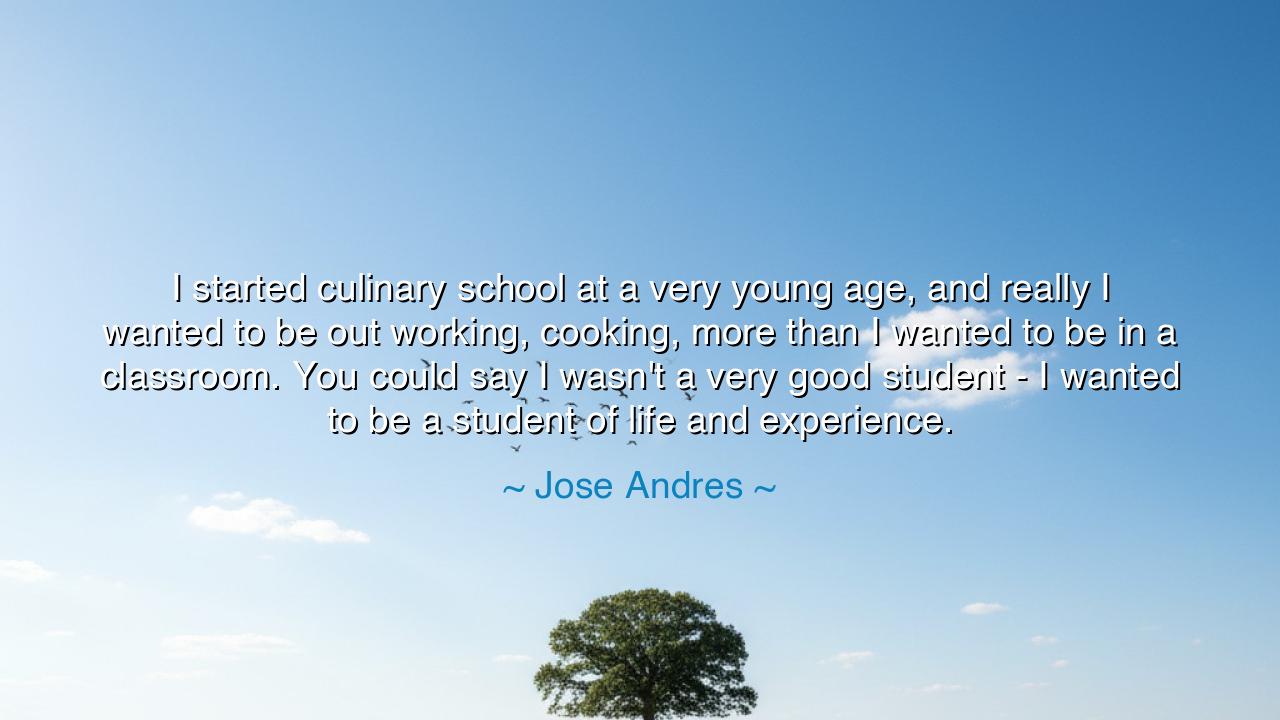
I started culinary school at a very young age, and really I
I started culinary school at a very young age, and really I wanted to be out working, cooking, more than I wanted to be in a classroom. You could say I wasn't a very good student - I wanted to be a student of life and experience.






When the great chef and humanitarian José Andrés said, “I started culinary school at a very young age, and really I wanted to be out working, cooking, more than I wanted to be in a classroom. You could say I wasn’t a very good student — I wanted to be a student of life and experience,” he was not confessing rebellion — he was proclaiming a philosophy. Beneath these words lies a truth as old as humanity itself: that wisdom is not confined to walls, and that the truest education is found in the living world, through the heat of action and the rhythm of work. His sentiment belongs not only to cooks or craftsmen, but to all who believe that experience is the master teacher — that the mind must be fed by the hand, the heart, and the will.
Andrés, born in Spain, entered the kitchen as a boy, restless and passionate. His hunger was not merely for food but for meaning — for the communion that happens when flame meets flesh, when strangers share a meal and become kin. The culinary classroom could offer him knowledge, yes, but not the fire of creation, not the immediacy of feeding another soul. He longed to learn from the world itself — from markets, from mentors, from the hum of life. Thus, when he says he was “a student of life and experience,” he honors a lineage older than any institution: the lineage of the apprentice, the wanderer, the seeker who learns by doing, by failing, by beginning again.
Such a spirit has lived through every age. Think of Leonardo da Vinci, who learned not from books alone, but from observing the play of light on water, the flight of birds, the anatomy of the body. Or Benjamin Franklin, who left school at ten and taught himself the secrets of electricity, diplomacy, and invention. These were not poor students — they were masters of the greater classroom of existence. Their curiosity was not tamed by structure, but unleashed by wonder. So it was with José Andrés, whose education would carry him from humble beginnings to the heart of Michelin-starred kitchens and, later, to the front lines of humanitarian aid, where he would feed millions struck by war and disaster.
For what he truly sought was not knowledge for its own sake, but understanding through service. Cooking, to Andrés, is not an art of isolation; it is a dialogue between self and world. The pan, the flame, the harvest — all are teachers. And when he left the classroom to work, he was not rejecting education, but redefining it. He was learning the lesson of sweat, humility, and empathy — lessons no textbook can impart. He became a student of hunger and hope, learning from fishermen, farmers, and refugees alike. Through them, he discovered that the heart’s wisdom is born in the act of giving.
His journey reflects a deeper truth: that life itself is the greatest school, and that experience, though costly, is the most generous teacher. Those who wait for perfect conditions to learn will never begin; those who step forward, even trembling, will find their education written in the dust and the light of the road. For every mistake teaches patience, every success teaches gratitude, and every encounter enlarges the soul. The world does not need perfect students — it needs passionate learners, those who dare to transform learning into living.
This is not to dismiss the classroom, but to expand its meaning. True wisdom is born when theory meets practice, when mind and body work together in harmony. A chef who knows technique but has never tasted hunger cannot cook with compassion. A philosopher who speaks of virtue but has never suffered cannot understand the depth of human endurance. It is in living — in burning one’s hands, in failing, in rising — that the soul becomes wise. To be a “student of life” is to accept that learning never ends, that every moment, joyful or painful, contains a lesson waiting to be received.
So, O seeker of knowledge, take this lesson to heart: live your learning. Do not fear the mess of experience, for it is through imperfection that truth is revealed. Step beyond the comfort of safety into the forge of doing. Let work teach you humility; let others teach you empathy. Feed both the body and the spirit of the world with your gifts. For life, as José Andrés shows us, is not a lecture — it is a feast. And only those who taste it with both courage and wonder will come to know its deepest flavor.
Thus, the teaching endures: the world itself is your teacher, and every day is a classroom. To live fully, to serve deeply, to learn endlessly — this is the art of the true student, the one who, like José Andrés, transforms knowledge into nourishment and turns the fire of passion into the light that feeds humanity.






AAdministratorAdministrator
Welcome, honored guests. Please leave a comment, we will respond soon